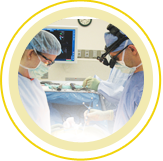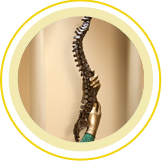A pinched nerve can occur in multiple places in your body, but is very common in the neck and back. Sometimes a pinched nerve will go away on its own, but if the symptoms don’t go away within a few weeks, treatment may be necessary.
 What is a pinched nerve?
What is a pinched nerve?
A “pinched nerve” is a term used to describe damage or injury to a nerve. This can be caused by compression, constriction, or stretching of the nerve, and is very common in the neck and lower back. If a disc in the spine weakens or tears, called a herniated disc, it can cause compression on a spinal nerve.
Symptoms of a pinched nerve
You may experience warning signs that you have a pinched nerve. If you have these symptoms, schedule an appointment at the Spine & Scoliosis Specialists to diagnose and treat the nerve compression accordingly.
- Pain in the area of the damaged nerve, or radiating pain
- Numbness or tingling
- A sensation of pins and needles
- Muscle weakness
If you have these symptoms, your doctor may perform a nerve conduction study, an EMG (electromyography), or an MRI (magnetic resonance imaging) to see if and where you have damaged nerves. This will help your doctor determine the best treatment plan for you.
Treatment for nerve compression
If nerve compression isn’t treated, it can cause other problems due to swelling, pressure, and scarring.
Medication
Over-the-counter or prescriptions medications may be recommended to help reduce the swelling and ease pain. Medicine can include NSAIDs (nonsteroidal anti-inflammatory drugs), oral corticosteroids, or narcotics.
Injections
Steroid injections are commonly used to treat a herniated disc, because they provide pain relief and calm inflammation right at the nerve root. An epidural steroid injection is an outpatient treatment that usually takes effect within 2-3 days.
Surgery
Depending on the cause of the nerve compression and severity of the symptoms, surgery may be needed. Your doctor may also recommend surgery after other treatments have been attempted.
- Laminotomy or Laminectomy – partial or complete removal of the lamina. This procedure removes bone from the lower spine to relive pressure on the compressed nerve.
- Discectomy – removing part of a herniated disc. This will relieve pressure on the nerve that is causing symptoms of pain, numbness, or weakness.
If you have symptoms that signal a pinched nerve, contact our spine specialists at 336.333.6306 to schedule an appointment.



